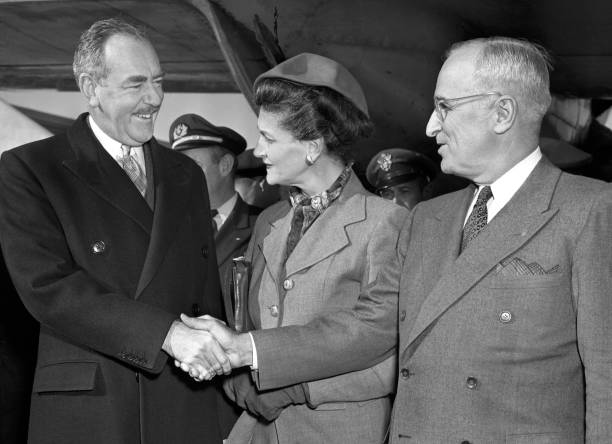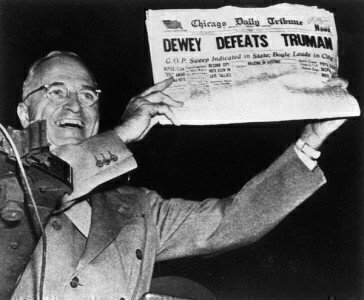
A favorite question that was asked by pundits and historians in 1989 revolved around who was responsible for the bringing down of the Berlin Wall, and two years later the collapse of the Soviet Union. President George H.W. Bush took credit for winning the Cold War, while others argued it was due to the Reagan presidency. In his new book, SAVING FREEDOM: TRUMAN, THE COLD WAR, AND THE FIGHTFOR WESTERN CIVILIZATION MSNBC “Morning Joe” host, Joe Scarborough argues that it was because of the policies implemented by President Harry S. Truman which allowed the United States to become the lone superpower in the early 1990s.
For those who are conversant with the events and personalities that dominated the foreign policy debate in the post-World War era Scarborough offers little that has not been written elsewhere. However, to the author’s credit he tells an absorbing story that created the foundation of American foreign policy that lasted for over seven decades.
One of the books dominant themes is the idea that the United States should assume the mantle of world leadership because of the vacuum created by England’s financial distress and the socialist agenda of the Labour Party. This concept was the anti-thesis of American foreign policy since the founding of the republic and George Washington’s “Farewell Address” that called for “no entangling alliances” and became the basis of American isolationism. The Democratic Party had been open to world leadership dating to Woodrow Wilson’s concept of economic internationalism, but the 1920s saw a fundamental change brought about by Republican disengagement on the world stage. Scarborough argues it took men like George C. Marshall, Dean Acheson, George Kennan, and Harry Truman to confront Soviet expansionism along with Republican senator Arthur Vandenberg for the United States to accept the challenge and implement a policy of containment rather than pre-war appeasement when confronted by a threatening autocracy.

(Undersecretary of State Dean Acheson shaking hands with President Truman)
Scarborough begins his argument with the situation that existed in Greece in 1946 and tries argues that aid to Greece and Turkey formed the basis of the Truman Doctrine discussed in the context of the history of American foreign relations. In doing so, Scarborough, for me at least has written a rendition of “Foreign Policy for Dummies” as he provides a series of broad surveys of foreign policy issues in each chapter to explain events. At times he goes a bit far exemplified by the unnecessary chapter dealing with Palestine. Scarborough at times can be somewhat verbose as he frames situations, for example, “Soviet ambitions were set in motion. Like a shark smelling blood in the ocean, Stalin was ready to move on British former colonies and clients.” Further, Scarborough has the annoying habit at the conclusion of a number of chapters resorting to a false sense of drama by asking superficial questions, I assume to enhance a sense of foreboding. I would suggest that he let the material playout, rather forcing the narrative.
As I read the book, I got the feeling that the monograph was overly interspersed with speeches, whether Truman on the stump trying to gain support for aid to Greece and Turkey, speeches by Senators and House members in their respective committees or on the floor of the Senate and House chambers, and witnesses called before Congressional committees. At times I felt I was reading a book of speeches and dialogue linked by a narrative rather than a discussion that had great potential for insight and analysis. Further, when one examines Scarborough’s sources, he provides extraordinarily little. With no end notes or bibliography, he offers a short bibliographical essay that encompasses roughly sixteen secondary sources and the mention of the THE FOREIGN RELATIONS OF THE UNITED STATES (FRUS) series published by the State Department. Further he should pay more attention to critical details like his discussion of the Monroe Doctrine visa vie the Truman Doctrine as he leaves out the role of the British and their Foreign Secretary, George Canning. He may argue that the Truman Doctrine was the successor to the Monroe Doctrine, but he forgets that at the turn of the century Theodore Roosevelt instituted the Roosevelt Corollary.

To Scarborough’s credit he writes in a noticeably clear and understandable prose. His discussion of the debate in Congress, newspapers, and the personalities involved reflects a command of the historical material, and his coverage of political negotiations and the preparation of the American people for the passage of the Truman Doctrine and its significance is well done. He stresses the reactionary and regressive nature of the Greek regime as an obstacle to obtaining Congressional aid and his analysis of Truman’s speech to Congress is dead on. But again, at times he is prone to overstatement. His key argument is strong that Truman engaged in one of the “greatest selling” jobs of any president as he convinced an isolationist leaning congress to support an internationalist policy.
In the end we are left with a dichotomy; an incomplete narrative, but with a theme that seems to hold together in terms of the importance of the Truman Doctrine over the last seventy years or so. If there is a lesson to be learned from Scarborough’s monograph it is the importance of pursuing bipartisan approaches to major foreign policy issues and that politicians need to weigh issues in relation to their effect on American national security, not political polls, commentary of pundits on cable news, or the demands of an autocratic leaning president.

